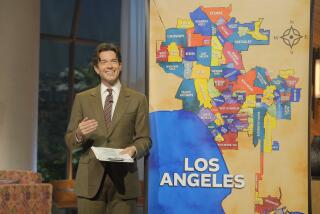What Becomes a Legend Most? Retiring While Still Sharp
Is it always desirable to be able to say “I saw one of the legends,” no matter how far from their pedestals some eventually fall?
There is an undeniable thrill in watching someone considered the world’s greatest anything: violinist, baseball player or, for that matter, window cleaner.
Maybe that’s because so few people are able or willing to make the sacrifices necessary to transcend all the others who have come before and to set a new standard in whatever they do.
Most of us must be content with basic competence in our endeavors. One of the compensations for being part of the crowd is the opportunity to see someone who rises above.
But seeing real greatness up close isn’t always as rewarding as we’d expect.
This week, nearly 3,000 of us checked our ordinariness at the door of the Orange County Performing Arts Center to spend a few hours with one of the century’s pre-eminent performers, Marcel Marceau.
Mention his name and with Pavlovian reliability, virtually anyone who has been minimally sentient during the last 30 years will describe him as “the world’s greatest mime.”
Ignore the apparent narrowness of the field (can anyone name the world’s second -greatest mime?). Marceau rightfully can take credit for reviving an ancient art form and proving to the modern world how timeless and pertinent mime can be.
Performing his classic “The Mask Maker” at the Center, he created a comic routine in which he tried on a series of imaginary masks. Beyond the amazement factor--how dramatically and quickly he exchanged facial expressions--”The Mask Maker” made a subtle point about the power that expressions have over a person’s attitude. When Marceau found that he couldn’t remove a grinning clown’s mask, he sobbed--gooney smile beaming all the while. Finally, he threw up his hands and gave in to joy.
At his best, Marceau gave inspiring testament to the dramatic heights that can be achieved without uttering a word.
But moments of greatness like that were few. The concrete images I remembered him conjuring on TV during the ‘50s and ‘60s materialized only occasionally. In “The Sculptor,” one used to actually feel balls of clay as he tossed them from hand to hand. This time around we had to settle for memories.
And that pointed up the risk in seeking out legends late in their careers.
Sure, the public owes a certain amount of deference to any performer or artist who has created something immortal. But performers should have that same sense of responsibility to, and respect for, their own reputations.
As a lifelong rock ‘n’ roll fan, but one who wasn’t old enough to go to concerts in the ‘50s, I struggled over whether to see Elvis Presley both times he performed at Anaheim Convention Center in the 1970s.
On one level, I regret never attending a concert by the man who once personified everything exhilarating, sexy and rebellious about rock ‘n’ roll. But at that point in his career, Elvis was a bloated parody of himself, and I preferred not to see him at all than to see him like that.
Likewise, ballet superstar Rudolph Nureyev, who brings his Paris Opera Ballet to Orange County in June, still has tremendous box office appeal; his name alone will lure multitudes wishing to catch one of the great figures in modern ballet. But at 49, Nureyev is no longer the spectacular dancer who dazzled the world in the ‘60s and early ‘70s.
At 64, Marcel Marceau’s execution of many classic routines was dull around the edges, less convincing than it was 20 or 30 years ago. I’ll bet a lot of people walked away from the Center on Monday night wondering what all the fuss was about. Indeed, there was a significant stream of people heading to the parking lot at intermission--and more exited Segerstrom Hall well before the end of the show.
Part of it was the considerable length of the show--nearly three hours. Part of it was the venue--a 3,000-seat hall is simply too big for a man whose act depends on the raising of an eyebrow, the crook of a hand or the wrinkle of a nose to create a whole imaginary world.
But whenever the bandwagon of legends rolls through town, you’re always taking a chance that present won’t measure up to past.
Personally, I’d rather watch that bandwagon pass by than to catch it on the downhill slide.
More to Read
The biggest entertainment stories
Get our big stories about Hollywood, film, television, music, arts, culture and more right in your inbox as soon as they publish.
You may occasionally receive promotional content from the Los Angeles Times.





